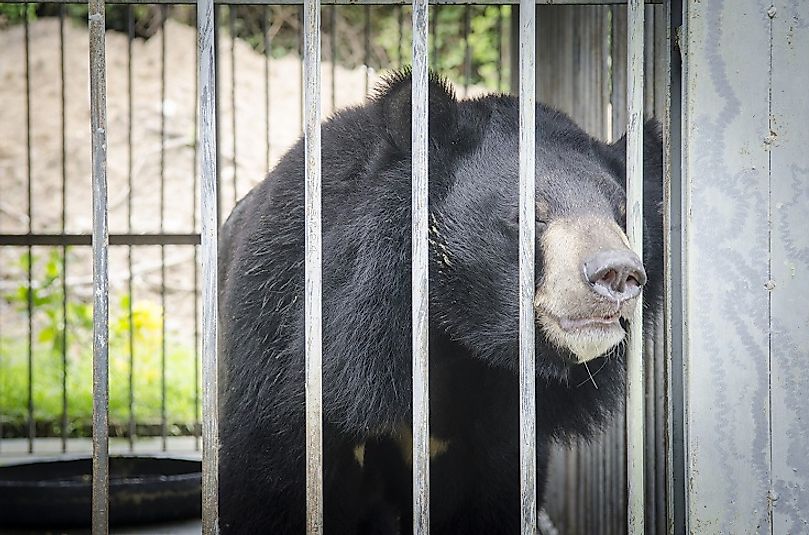The Horrors Of The Bear Bile Trade

5. Human Uses of Bear Bile
Bear farming for bile is one of the most controversial practices of all times and the cruelty associated with it has often been the subject of massive protests by international animal welfare organizations and the animal lovers of the world. The use of bear bile is heavily prescribed by Chinese traditional doctors. Chinese traditional medicine claims that bear bile cures sore throats, gallstones, reduces the effects of alcohol over consumption, and treats hemorrhoids. The ursodeoxycholic acid composition of bear bile is believed to be responsible for these curative effects of the product. However, modern medical science condemns the use of bear bile and claims that it is completely unnecessary to subject bears to extensive torture to extract bile when alternative and better medicines are easily available in the market.
4. Location of the Facilities
About 12,000 bears are farmed for bile in China, Vietnam, South Korea, Myanmar, and Laos. The bears are usually bred in captivity but cubs are often captured from the wild to supplement the stock population in the farms. A wild bear cub can be sold at about $400 USD, a good enough sum to lure people to engage in cub capturing from the wild. The bile bear farming facilities are a sorry sight with large bears entrapped in cramped cages for life. The bear is exploited for bile extraction from the age of three to the age of up to 20 years. When the bears are no longer able to generate sufficient volumes of bile, they are killed for their meat, fur, paws, and gall bladders.
3. Extraction Process
Bile is extracted from the bears by a number of processes, many of them categorized as inhumane by most animal welfare organizations. One of the processes involve the puncturing of the gall bladder to extract bile. In this process, an ultrasound image is first used to locate the position of the gall bladder. Permanent implantation, catheterization, and full-jacket method are three closely related procedures where bile is extracted through a tube or catheter inserted temporarily or permanently into the bear’s abdomen. The free drip method is one of the most dangerous methods of bile extraction where a permanent hole made through the abdomen and gall bladder of the bear allows bile to drip out where it is collected in the container. This usually makes the wound vulnerable to infections and bile leaking into the abdomen leads to high rates of mortality. In other cases where the adult wild bears are caught and killed, the removal method is used to remove the gall bladder for a single time use of the organ. It is estimated that the low concern among the bear bile extractors for the health and welfare of the bears leads to less attention being paid towards the surgical procedures to extract bile. This leads to a 50% to 60% mortality among the bears.
2. Animal Abuse
According to animal lovers and animal welfare organizations, bear bile farms are a nightmare to behold. The bears are often confined to cages for a lifetime where they are unable to even straighten their backs. They are simply treated as bile generating objects without any heed paid to them as living creatures that have the right to enjoy a free and painless life in the wild where they belong. The surgeries conducted on the bears are often done in a careless manner without any heed being paid to the agony of the animals or the post-surgery effects on these creatures. Animal welfare organizations thus criticize the bear bile farming as grotesque acts of man that needs to be checked immediately. They claim that animals feel pain just like humans and there is no way animal abuse in the form of bile bear farming must be allowed to continue in the future.
1. Regulations and Legal Intervention
Despite worldwide protests against bile bear farming, the practice is still completely legal in China. Though there are regulations attempting to curb the cruel practices of the trade, very little practical implementation of the regulations is observed. In Vietnam, the practice was banned in 2005. However, there are reports that loopholes in the law still allow the practice to continue unabated in certain areas of the country. Many animal welfare organizations are determined to continue the fight to stop bear bile farming in all parts of the world. A survey conducted in 2011 by Animal Asia exhibited that 87% of the Chinese people were, in fact, against the cruelty meted out to bears in bear bile farms. Some pharmacies in China and large sections of the medical community in the country are also trying to discourage the use of bear bile and instead use other easily available and cheap, cruelty free medical alternatives.







